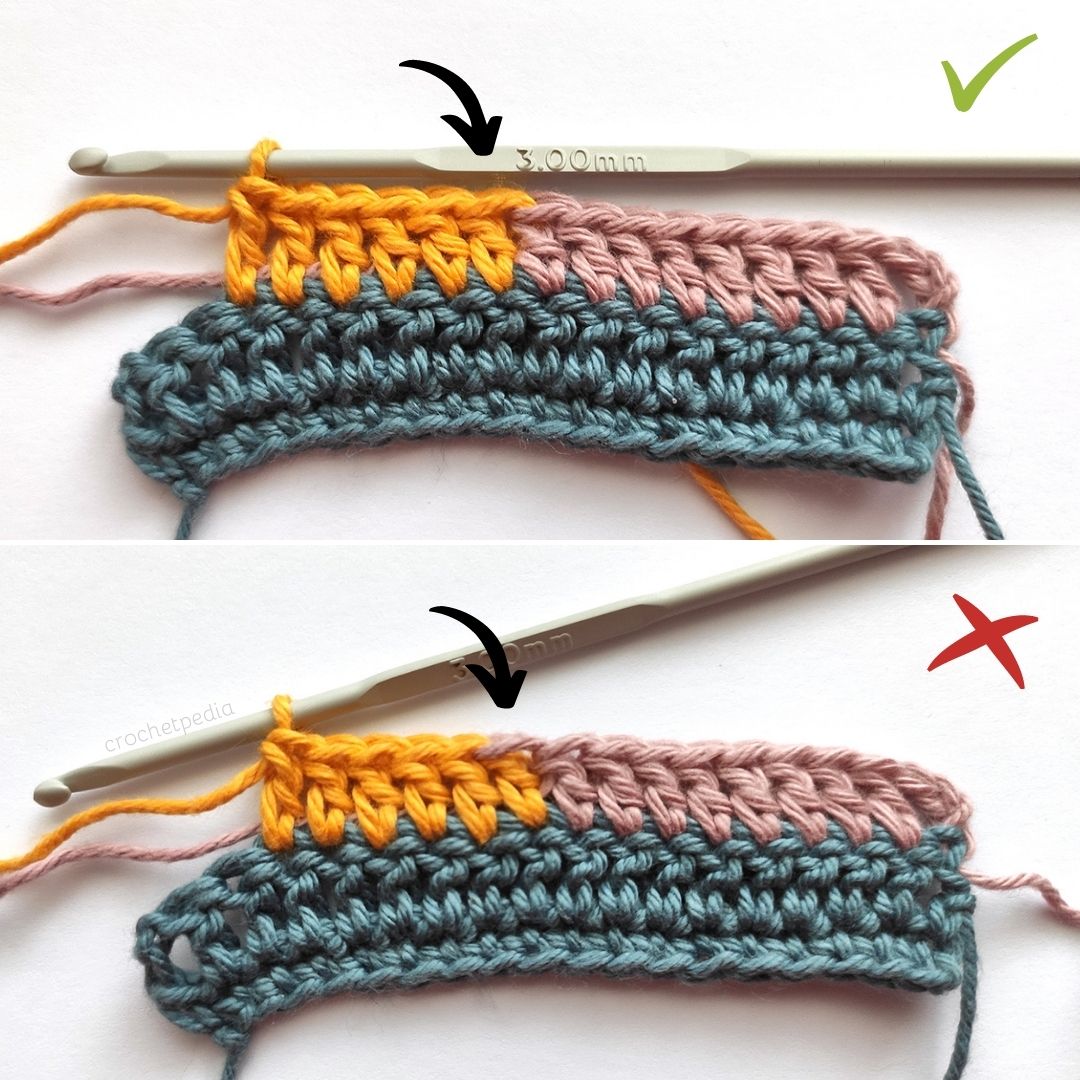Have you ever stared at a crocheted project, yearning to add a splash of color but unsure how to make the transition smooth and professional? Introducing a new color into your crochet can be a delightful way to add depth, texture, and visual interest. Whether you’re working on a granny square blanket, a vibrant scarf, or a playful amigurumi toy, mastering color changes is an essential skill for any crocheter.

Image: crochetpedia.com
This comprehensive guide will unravel the secrets of seamlessly incorporating new colors into your crochet masterpieces. We’ll explore various techniques, from the straightforward to the more intricate, providing you with the tools and confidence to create stunning multi-color designs.
Understanding the Basics
Before we delve into the exciting world of color changes, let’s lay a solid foundation. Two fundamental techniques form the backbone of most color transitions:
1. Carrying the Yarn
Carrying the yarn is a method that minimizes bulk and prevents unsightly holes in your work. It involves carrying the unused color along with the working yarn, making sure it’s neatly tucked behind the current stitch. Here’s how it’s done:
- Work the last stitch of the current color.
- Bring the new color to the front of the work, keeping the old color in the back.
- Wrap the new color around the hook, as if you were going to make a stitch.
- Pull the loop through the stitch, working with the new color on the hook.
- Continue working with the new color.
- Carry the old color along, keeping it snug against your work and behind the stitches.
2. The “Slip Knot” Method
The slip knot method, also known as the “color change stitch,” is a simple yet effective technique that involves creating a small loop with the new color before changing. This helps maintain a smooth and even fabric.
- Work the last stitch of the current color.
- Bring the new color to the front of the work.
- Make a slip knot with the new color, leaving a small loop.
- Attach the slip knot to the same loop as the last worked stitch.
- Pull the slip knot through the loop. This joins the two colors seamlessly.
- Continue crocheting with the new color.

Image: yourcrochet.com
Choosing the Right Technique
The “right” technique ultimately depends on your personal preference and the design you’re creating.
- Carrying the yarn is often favoured for creating smooth transitions and maintaining texture, especially when working with delicate yarns or intricate patterns. It is excellent for techniques such as fair isle crochet.
- The slip knot method is easier to learn and can be used in a wider range of projects, from simple crochet blankets to amigurumi toys. It is often perfect for creating stripes and other simple color changes.
Beyond the Basics: Creative Variations
As you become more comfortable with color changes, you can explore various techniques to achieve unique visual effects. Here are a few ideas to inspire you:
1. The “Intarsia” Method
This technique involves working with two colors at a time, changing the working color frequently to create intricate patterns. Intarsia crochet is often used for creating realistic images or intricate designs.
2. The “Tapestry” Method
Similar to intarsia, tapestry crochet uses multiple colors worked simultaneously to create woven-like patterns. This technique is ideal for creating detailed designs and intricate borders.
3. The “Mosaic” Method
Mosaic crochet incorporates the use of color changes to create distinct blocks of color within a single row or stitch. The results are often geometric and strikingly modern.
Tips for Seamless Transitions
To ensure that your color changes are smooth and invisible, keep these tips in mind:
- Practice: The more you practice, the more confident you will become with your color changes. Don’t be afraid to experiment with various techniques and find what works best for you.
- Keep it Tight: When changing colors, make sure your stitches are tight and even, to avoid gaps or inconsistencies in the fabric.
- Don’t Over-Twist: Avoid twisting the yarn behind your work, as this can create bulk and unevenness in your fabric.
- Be Gentle with your yarns, preventing snags and pulls.
- Look Ahead: Take a moment to look ahead in your pattern and anticipate where you’ll need to change colors. This can help you maintain a consistent flow throughout your project.
Choosing the Right Colors
The success of your multi-color crochet lies in part in choosing the right colors to complement each other. Consider these tips:
- Color Wheel: Explore the color wheel to understand how different colors work together. Adjacent colors on the wheel create harmonious blends, while contrasting colors opposite each other offer high impact.
- Value: Pay attention to the value (lightness or darkness) of your colors. Varying shades of the same hue can add depth and dimension, while contrasting values create a strong visual impact.
- Temperature: Consider the temperature of your colors (warm or cool). Warm colors evoke feelings of warmth and energy, while cool colors inspire calmness and tranquility.
- Personal Style: Ultimately, trust your own intuition and choose colors that resonate with your personal style and the overall aesthetic of the project.
How To Add A New Color When Crocheting
Experiment and Have Fun!
Adding color to your crochet is a journey of creative exploration. Don’t be afraid to experiment with different techniques and embrace the possibilities. The more you practice and learn, the more confident you will become. As you master color changes, you’ll discover a whole new world of creative possibilities, enabling you to craft stunning and unique crochet pieces that reflect your personal style.
So, grab your hooks, yarns, and color palettes, and let your imagination run wild!





